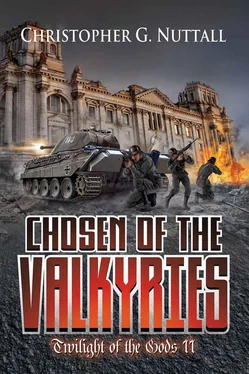“Maybe less than that,” Voss commented. “Ammunitions expenditures are always far – far – higher than predicted. I imagine that their logistics problems would turn into nightmares soon enough.”
Krueger nodded. “The problem, sir,” he added, looking directly at Volker, “is that we’re in a mess too.”
He went on before anyone could say a word. “Our industries were pushing the limits long before the… the uprising,” he continued. “Machinery was becoming outdated, workers were working longer hours for less pay. We were robbing Peter to pay Paul right across the Reich , sir, and the real value of our currency was declining sharply. The push for unionising the workforce only made matters worse, as it added another factor to our considerations.”
“I believe I am aware of that,” Volker said, lightly.
“Then you have to face up to the implications,” Krueger said, bluntly. “There are just too many problems, deeply rooted within our industrial base, for a quick fix to work. We need to replace vast quantities of machinery and train up hundreds of thousands of new workers very – very – quickly, which will come at a staggering cost. Frankly, sir, we may have to concede that we have lost the arms race with the Americans.”
“Then the Americans will crush us,” Voss snapped.
“The Americans are hardly our problem at the moment,” Volker pointed out.
“Not now, no,” Krueger agreed. “Our best estimate is that it will cost upwards of a hundred billion Reichmarks to rebuild our economic base – and we don’t have a hundred billion Reichmarks . We’ll have to start on a smaller scale…”
“… During a war,” Voss reminded him.
“Exactly,” Krueger said. “We have a colossal shortage of money.”
Volker swallowed. A hundred billion Reichmarks ? He couldn’t even begin to imagine such a vast sum of money. There was no way he’d ever be a millionaire on his salary, let alone a billionaire . And getting the money was only the start of the problem. The unions would resist, strongly, training up more than a handful of new workers. They’d see it as an attempt to undermine their power and they’d be right. Hell, Volker himself would have opposed it when he’d been a Union Chief.
And how can we do all that , he asked himself, when there is a war underway ?
“Loot it from the French,” Voss suggested. “Or the Italians. They bend over to give us anything we want.”
“They don’t have the money or machinery we need,” Krueger snapped. “Their currencies are pegged to ours, so the real value of their money is declining too. The best we can hope for, from either of them, is more poorly-trained workers and food supplies. And looting them would mean drawing forces away from the eastern border!”
Volker held up his hand. “Can we supply the demands of the war?”
“Perhaps,” Krueger said. “But right now, even our ammunition plants are in trouble.”
“And without ammunition, we can’t fight,” Voss said. He sounded tired and harassed. “Stop producing ladies underwear and start turning out more shells!”
“It isn’t that easy and you know it,” Krueger snapped. He sounded tired too. “A plant designed for producing one thing cannot easily be modified to produce something else!”
Volker took a long moment to think as the bickering began in earnest. On one hand, Krueger was right. The economy was in a mess. He had no real dislike for the Americans – both sides had supported rebels, insurgents and terrorists – but he had to worry about the long-term effects of an economic collapse. And yet, on the other hand, there was a war on. The economic issues were secondary to preserving the provisional government.
He tapped the table, again. “Hans,” he said. “How long can you paper over the cracks?”
“I’ve been doing that for the last five years,” Krueger said. He rubbed his eyes. “There are just too many variables, sir. I can do my best to freeze prices, but unless we manage to stop our money declining in value… well, all we’d do is shift sales into the black market. I don’t think it will be easy to force farmers to sell at a loss.”
“Then confiscate their stocks,” Voss said.
“That would ensure we wouldn’t get any harvests next year,” Krueger said. “The Russians learned – too late – that collectivism reduced yields. We don’t want to make the same mistake ourselves.”
He looked at Volker. “I think we might just be able to stretch matters out for another year, but a single major disaster will almost certainly set off a chain reaction that will bring our economies down,” he added. “As it is, we may have to go back to rationing food very quickly. We’re just not getting any additional supplies from Germany East – or the French.”
Gudrun will have to discuss that too , Volker thought. And hope to hell the French don’t demand too much in return .
“See to it,” he ordered. It wasn’t going to go down well with the population – it seemed as though everyone had a political opinion these days and was willing to share it – but there wasn’t any choice. “I’ll announce it once you’ve got the groundwork in place and explain the problem. Maybe there won’t be too many objections.”
“Hah,” Voss commented.
Volker suspected he was right. The German population knew better than to believe what someone said on the radio, particularly now. They might be told that things were getting better – or they had been, before the uprising – but they could see that costs were steadily rising higher, when products were available at all. It was ironic, he had to admit, that people conditioned to disbelieve whatever they were told by the previous government wouldn’t believe him either, yet it would just have to be endured. There was nothing that could be done to make the population trust him, save for carefully building up a reputation for telling the truth. But that would take years.
“I think a basic supply of food each week would be reassuring to most people,” Krueger said, bluntly. “It’s going to get worse before it gets better.”
“And we’re moving people from the east,” Voss added. “We’re going to have to feed them too.”
“I know,” Krueger said. It was yet another headache. “And people here aren’t going to welcome them either.”
Volker sighed, inwardly. The refugees were unlikely to be welcomed, not by people who barely had enough to eat and drink themselves. But they had to be moved from their homes, if only to keep them safe. The SS was unlikely to be pleasant to anyone who hadn’t already declared themselves for Germany East. Indeed, it was quite likely that any civilians they encountered would pay a steep price.
He sighed, again. He needed his sleep; he needed to lie beside his wife and pretend, if only for a few hours, that he was nothing more than a simple factory worker. But there were too many things they needed to discuss – and hash out – before he could seek his bed. A mistake now might come back to haunt them when the SS finally started its advance.
At least Holliston has his own problems , he thought, dryly. But does he have so many bickering subordinates ?
Germanica (Moscow), Germany East
1 September 1985
Karl Holliston had always loved Germanica.
He stood on the balcony and gazed out over the city. Moscow – old Moscow – was gone, save for a handful of buildings that had once been the beating heart of the long-dead Union of Soviet Socialist Republics. Schoolchildren were taken there every year, where they were told about how Stalin had been trying to flee Moscow when he’d been killed and just how much the Reich had done for the country. Russia was now the breadbasket of the Reich , the source of true Aryan greatness. The fact that the Russians themselves were a threatened minority in their own country was neither here nor there, as far as Holliston and his fellows were concerned. They were, after all, Untermenschen .
Читать дальше












